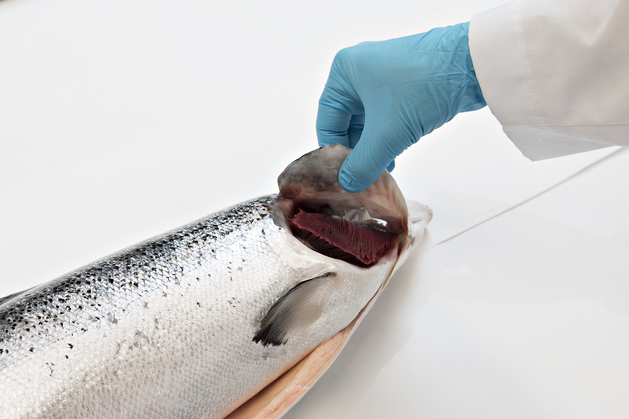EATFISH
Genetics of AGD and gill health in Atlantic salmon

In this project we evaluate phenotypes to describe resistance to amoebic gill disease, with regards to their ability to improve gill health through selective breeding.
Start
01. Jan 2021
End
31. Dec 2024
Funded by
EU - Horizon 2020
Cooperation
MOWI, Norwegian University of Life Sciences, Marine and Freshwater Research Institute of Iceland, Wageningen University.
Project Manager(s):
Other Participants:
Background
The EATFISH project includes 15 PhD students, who works in different European institutions. One of these is working at Nofima, studying amoebic gill disease (AGD).
AGD is a parasitic disease of marine salmonid and non-salmonid fish caused by the amoeba Paramoeba perurans.
In farmed Atlantic salmon in Australia, AGD is the dominating disease and selective breeding is used to reduce the need for freshwater treatment.
The current standard phenotypic method for AGD resistance determination is gill score, which is nonlethal but still invasive and involves subjective evaluation of the gill. Genetic parameters for gill score have also shown to vary between lab and field trials, and between field trials performed in Europe and Tasmania, possibly because of different environmental factors or other pathogens, interfering with the AGD infection in some of the environments.
To improve gill health in Norway, there is a need for refining the phenotyping and/or the estimation of breeding values.
Goal
Identify the most suitable method(s) to improve gill health of Atlantic salmon through selective breeding
Sub goals
- Identify the optimal breeding value estimation method to evaluate AGD resistance in Atlantic salmon
- Identify quantitative trait loci and fine map regions to identify candidate genes involved in gill health in Atlantic salmon
- Evaluate the possibility of using hyperspectral imaging and/or simultaneous multiplex amoeba quantification and host genotyping for AGD resistance evaluation
What we do
Afees Ajasa is empoloyed as a PhD student in the EATFISH project. He analyses data MOWI has gathered over year to identify the best method to evaluate and breed for increased AGD resistance and improved gill health in Atlantic salmon.
In 2023, he will participate in new experiments with MOWI, both a controlled challenge test and field registrations of AGD. Here, he will test alternative phenotyping methods which may give more or better information than the gill scoring method developed and used in Tasmania.
An important component of EATFISH is networking. The PhD students have secondments where they visit other partner institutions in the project. Afees will make his secondment with MOWI in 2023 to participate in AGD trials and he will also have a secondment with MATIS on Iceland in 2024.
At the same time, Nofima accepts students from other institutions for shorter or longer stays with us. Three students from EATFISH have been visiting Nofima in 2022. One of them will come back in 2023 and then also two other students have planned secondments with Nofima.
Publications
Similar projects